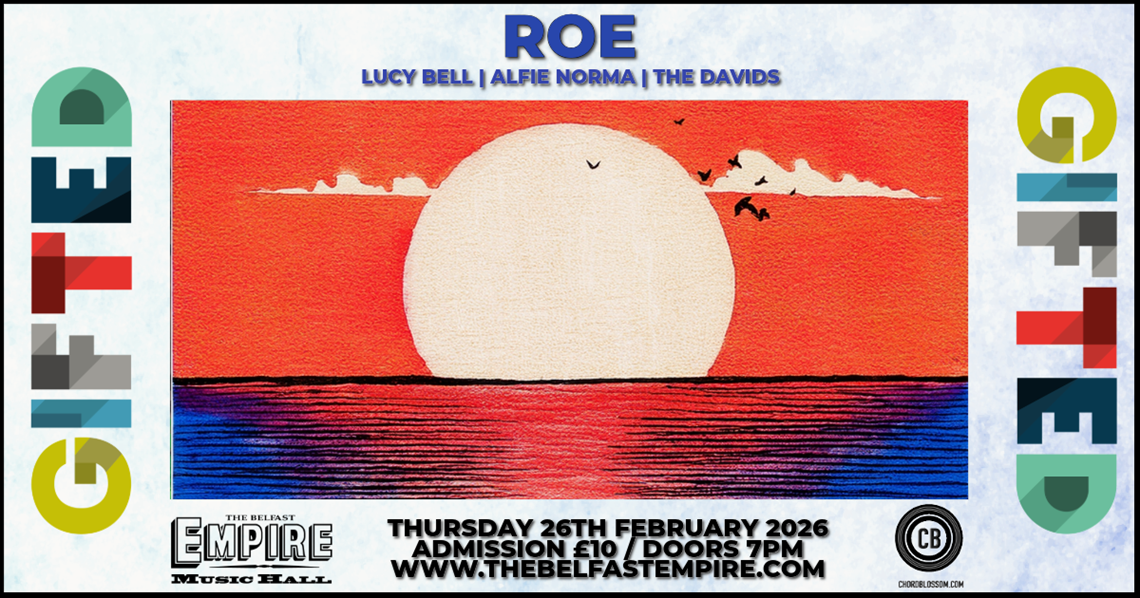Joshua Burnside‘s debut album Ephrata was released in 2017 to much deserving acclaim. The culmination of years of touring and honing his experimental folk sound, the album scooped the Northern Ireland Music Prize that year, and this year he released his follow-up. With another twelve months until the ext awards, Into the Depths of Hell is already seen as one of the albums of the year.
Released in September, Burnside’s dark folk tales have resonated strongly with a year of uncertainty. Into the Depths of Hell sees him flirt with Irish mythology, the Troubles and destruction, both personal and global. The title itself, attention grabbing and sufficiently macabre to toe a line between the heavy and the tongue in cheek, stems from his much younger days.
“It comes from a childhood memory, I was about 3 or 4 and grounded. I decided I was going to jump out the ground floor window of my bedroom to run away from home. Just before I did my sister stopped me and said ‘if you jump out that window, you’ll go straight through the ground and into the depths of hell’. That terrified me and the imagery stuck with me. I like how metal it is for a ‘folk’ artist, I thought it would be a fun title.”
One of the album’s most well received tracks is latest single ‘Under The Concrete’. It’s a song that snakes through jaunty verses, handclaps, trumpets and singalong moments but under the surface the lyrics chime with the album title. “It stems from that memory and spirals outwards into other themes of guilt and destruction, and how we harm ourselves and the planet.”
It’s no easy subject matter, but of course Burnside, as his music has always suggested, doesn’t sit still or settle. As an album it traces connections between varying stories, tying into the overarching moods. ‘Noa Mercier’, Celtic and mythic in nature, was one that piqued my attention from the off.
“I had been writing a concept album about a guy called Patrick Murphy, a giant from Killowen. I was living down there and I got interested in the local history. He travelled around Europe with circuses but sadly died of smallpox at the young age of 28. I was also about 28 when I lived there and resonated with this character, so I started writing a concept album about him and his love interest, Noa Mercier. I was blending history and fiction. The song is his swansong, declaring his love for her, a trapeze artist. I liked the mood of the song so it found its way onto the album. But I think I’ll go back to the album and they’ll make an appearance in a future project.”
The relatability of Burnside’s songs has always been there. It doesn’t matter whether he’s singing of characters, past events or personal stories, Columbia or Northern Ireland, there’s always something to catch onto, a connection borne out of Burnside’s own approach to writing. I asked him how often he blended fiction with his personal experiences. “I do that a lot”, he says. “I think you have to write from what you know, it definitely adds potency and authenticity to your lyrics. But I like to use characters of my own invention and distance myself from those emotions sometimes, like roleplaying. You can discover stuff about yourself. I like to write from other people’s perspectives and blend it with my own life.”
Much like Ephrata, Into the Depths of Hell mixes the two but the line is not always obvious. Burnside laughs as he recounts one review of War on Everything, a rocky number that’s bears similarities to his own ‘Tunnels, Pt. 2’, written about an older couple but drawing upon experiences he had growing up. “There was an article about that song when it came out that said ‘Burnside’s obviously having a hard time with his partner'”, he laughs. “Don’t you understand I’m not always speaking autobiographically, I’m very happily engaged.”

With many artists that first album is the labour of years of work, artists often revisiting previous singles and older material on their first longform tracklisting. A second album, with a fresh slate and a blank page can pose a challenge for some but there are others that may relish it. When it comes to songwriting, Joshua Burnside seems to fall into the latter category. “I wrote all the songs for Ephrata in a pretty short space of time, in fact I probably rushed it because I just wanted to get an album out there. Lyrics wise everything came pretty easy for this album, I feel like there’s a lot for inspiration these days.”, he says.
“I put out some releases so I’d given myself time to really work on these songs. It was always the case where I’d write and record loads of songs, thinking it would be the second album. But as the date got closer I’d end up binning them and starting again. That’s a normal process for me. I think the pressure helps.”
The album is largely self produced, with Burnside working away in his studio in The Vault, Belfast. Eight of the tracks were produced there, with additional tracking and production in Smalltown America, Derry. This marked a return to his pre-Ephrata way of working. “With this album, the production process was mingled with the writing process. More like an electronic artist where how things are produced is as important as what chord or melody goes where. I think I prefer to work like that.”
But of course with greater freedom, and his tendency to scrap and start anew, things could have gone on and on. “I think giving yourself a deadline is a good way of doing it. I like to have a lot of control over how everything sounds but if you know you have to have it finished and it’s not quite right, that’s fine. I don’t like being in a recording studio where you’ve got a day to record a track. That’s too much pressure, I like to experiment and go into the detail. So it’s nice to have months and months in my own space tweaking away. I took a long time producing ‘And You Evade Him/Born in the Blood’ because I didn’t know when it was done. I was tweaking and twiddling with it for so long.”
Ephrata, he says, was a different way of working. Was this more hands on, self made approach more fulfilling? “Yes”, he says immediately. “I’m really proud of how it sounds and the fact I did so much more of it myself. That being said there was still a lot of help from different musicians coming in and different engineers on the drums for example. But it was more under my control, I’m a bit of a control freak so that satisfied me. There is satisfaction in doing it like this.”
The result speaks for itself. Into the Depths of Hell is a hugely accomplished album. The production is a thing of beauty, evoking dread, sadness and even the odd moment of euphoria across ten diverse tracks. It’s a journey that begins with doomed percussion and droning organs and ends with the fireside folk of ‘Nothing For Ye’ and the stuttering stop of a cassette. It’s a track that Burnside contends took influence from his regular folk club in the American Bar. “I think it’s fed into my writing and listening a great deal, just from learning so many songs at those sessions. Songs like ‘Nothing For Ye’ wouldn’t have been written if it wasn’t for getting into that scene. The heart of the songs are folk songs in one shape or another. I think if ‘Born in the Blood’ was stripped down, it would be like a John Martyn tune. But I think the production is what changes it from being folk music to being some other thing. Folk is at the heart of it but I just dress it up in weird clothes.”
On the bigger picture he says, “I definitely want everything to be a coherent whole but I wanted each track to have its own surprising element. I wanted it to sound like you’re listening to the song in an actual space, and suddenly the space changes, or you change. I wanted things to be in flux, not this static piece of music, the idea of listening in a space that’s collapsing around you.”
“There’s a lot of doom and gloom on the record. But it’s also an aesthetic thing where I like things to sound a bit strange and warbled. I like strange sounds.”
For Joshua Burnside, 2020 began with real tragedy, months before covid and lockdown. The death of Lyndon Stephens was felt by many in Northern Ireland and beyond. A towering figure in the music scene, he was a big influence and a guiding hand for a songwriter pursuing his craft full time. With Stephens, Champion Sound and Quiet Arch, Burnside realised his debut album but Stephens was no longer with us for the release of Into the Depths of Hell. “I’m glad he got to hear the album before he passed away, and gave it his blessing. It’s a shame he’s not here to see the album. I always remember how excited he was around release times. I feel like a lot of people who knew Lyndon haven’t really had the chance to grieve properly because of the anxiety and stress of pandemic. It’s been a shit year really.”
Despite everything that has happened this year, art and music have given relief to many. Whether through fantastical escape or music that reflects the anxiety of our times, the music of this year has been very welcome. Joshua Burnside’s Into the Depths of Hell manages to achieve both those aims. An album that resonates with grief, death and anxiety through the individual and the myth, but for all its gloom, Burnside’s music offers a wonderful escape.








